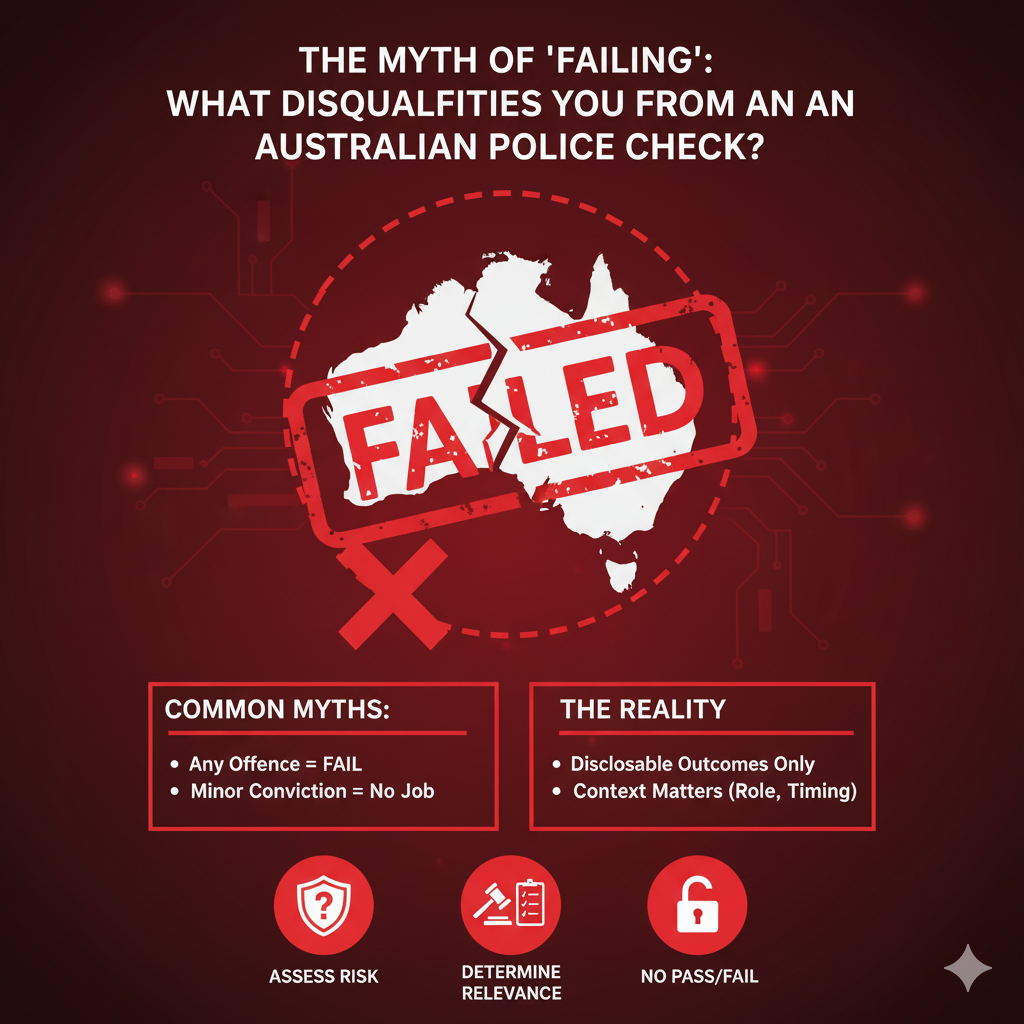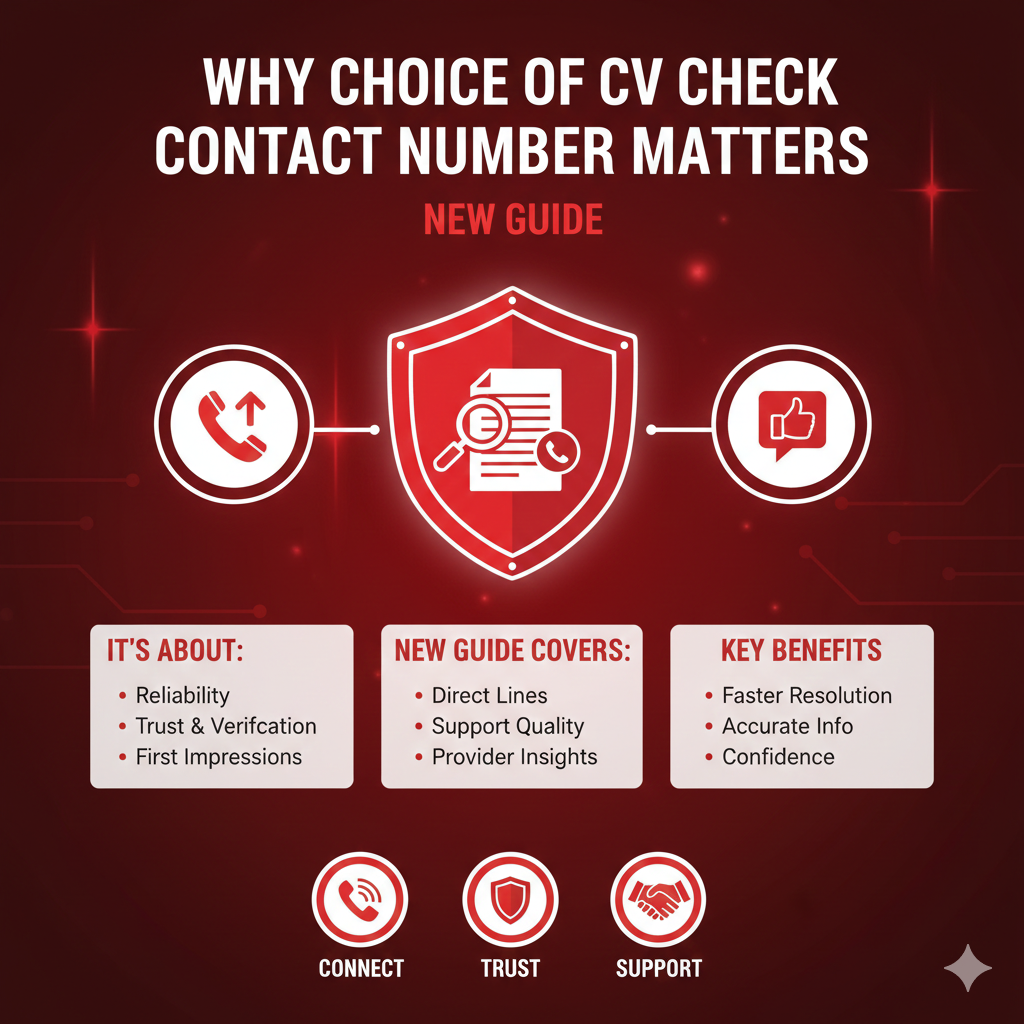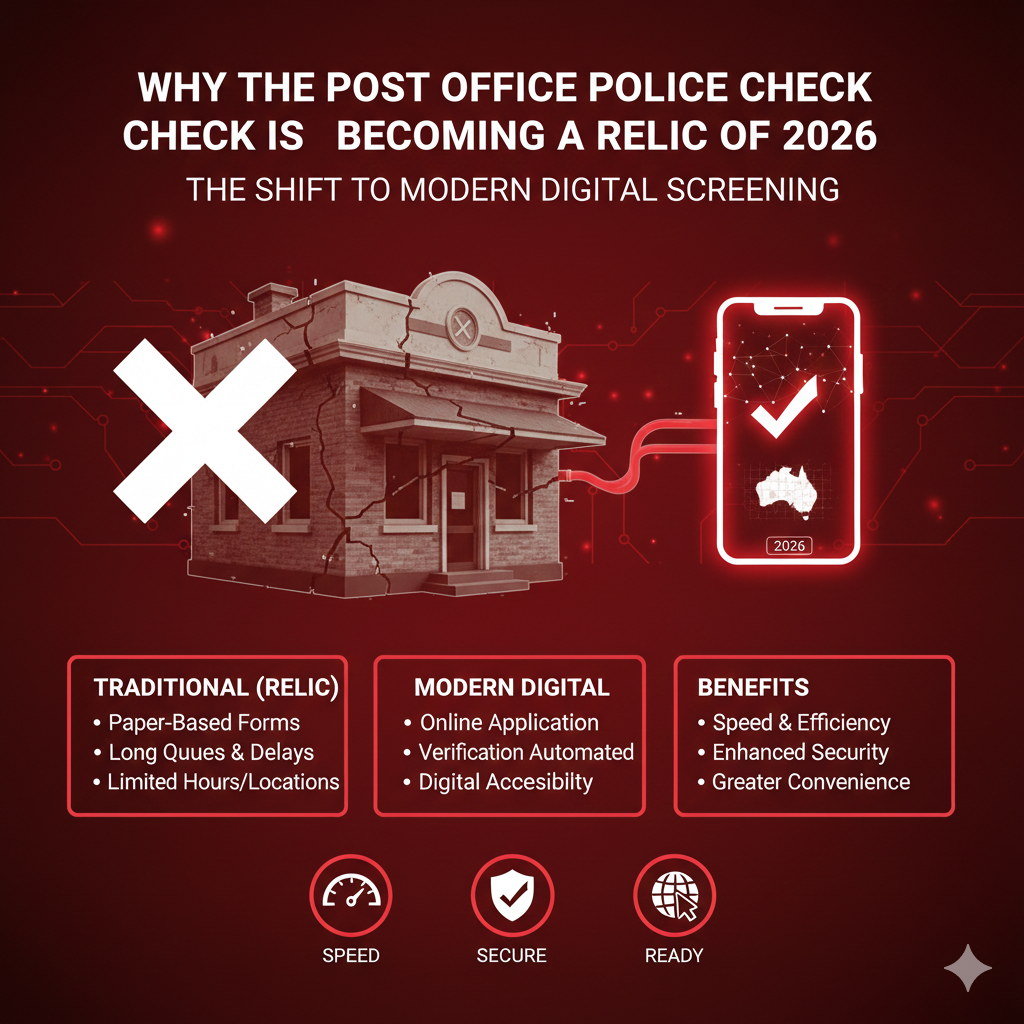A police check in Australia doesn’t give a pass or fail it simply reports Disclosable Court Outcomes (DCOs) based on your criminal history.
So, if you can’t technically “fail,” the real question for both job seekers and employers is: What Disqualifies You From an Australian Police Check? The answer lies not just in your criminal record, but in the crucial intersection of your past offences and the specific requirements of the job you are applying for.
This comprehensive guide from Rapid Screening will help you understand the nuances of the Australian police check system, detailing exactly which records are disclosed and, more importantly, how employers use this information to make a hiring decision.
Understanding the Nationally Coordinated Criminal History Check (NCCHC)
Before discussing disqualification, it is vital to know exactly what the check reveals. The Australian Criminal Intelligence Commission (ACIC) conducts the NCCHC and gathers information from police agencies across all Australian states and territories.
DCO vs. NDCO: The Real Check Outcome
The result of an NCCHC will be one of two things:
- No Disclosable Court Outcomes (NDCO): This means authorities find no police history for the individual, or they determine that any existing history is protected by non-disclosure legislation (such as a Spent Conviction Scheme) and therefore cannot release it. In the eyes of an employer, an NDCO is effectively a “pass.”
- Disclosable Court Outcomes (DCO): This lists certain convictions, findings of guilt, pending charges, good behaviour bonds, or other court orders that are legally permissible to be released to the requesting body.
Disqualification is triggered when the DCO is deemed relevant and prohibitive to the job role. Therefore, when people ask, “What Disqualifies You From an Australian Police Check?” they are really asking, “What record is disclosable and relevant enough to cost me the job?”
The Legal Framework: Disclosure vs. Disqualification
Australian law, including the Human Rights Commission Act, generally prohibits discrimination based on an irrelevant criminal record. This means that an employer cannot lawfully disqualify a candidate unless their DCO prevents them from performing the ‘inherent requirements’ of the job.
For instance, a minor historical offence for public nuisance might appear as a DCO, but it is unlikely to be relevant to a desk job in IT. However, a recent conviction for fraud is highly relevant—and thus potentially disqualifying—for a finance role.
The Role of Spent Convictions: What Stays Hidden?
The most common factor that prevents a conviction from appearing on a police check, and thus removing a disqualifying factor, is the Spent Convictions Scheme. These schemes operate at both the Commonwealth and State/Territory levels, designed to give individuals with minor, old offences a second chance.
Criteria for a Conviction to Become ‘Spent’
While laws vary between jurisdictions (e.g., NSW, Victoria, Queensland), a conviction is generally regarded as ‘spent’ if the following criteria are met.
- A specified crime-free waiting period has passed (usually 10 years for adults and 5 years for juveniles).
- The court did not sentence the individual to imprisonment, or it imposed a term of imprisonment below a certain threshold.
- The individual has not re-offended during the waiting period.
If an offence is officially committed, it is generally not disclosed on the NCCHC certificate, and the individual is legally entitled to deny its existence, effectively eliminating it as an answer to What Disqualifies You From an Australian Police Check?
Offences That Can Never Be ‘Spent’
Crucially, the Spent Convictions Scheme excludes certain serious offences, and authorities will almost always disclose them making these offences the most common reason for disqualification. These permanent disclosures often include:
- Convictions for Sexual Offences.
- Convictions for Serious Violence Offences.
For roles working with vulnerable populations, these records are almost universally disqualifying.
The Core Factors Determining a Negative Employment Outcome
Since the NCCHC is only a disclosure of facts, the ultimate decision on What Disqualifies You From an Australian Police Check? rests with the employer’s assessment process. Rapid Screening’s clients use a risk-assessment framework based on the following key factors:
Relevance to the ‘Inherent Requirements’ of the Job
This is the single most important factor. An employer must prove that the criminal record makes the candidate unsuitable for the core duties of the position.
- Financial Roles (Banking, Accounting): Convictions for theft, fraud, embezzlement, or deception are directly relevant to the inherent requirement of financial integrity and trustworthiness. These are highly likely to be disqualifying.
- Roles with Vulnerable Groups (Aged Care, Teaching, Childcare): Offences against the person, especially sexual or serious violent offences, are absolutely relevant and will disqualify a candidate due to the legal obligation to protect vulnerable people.
- Driver/Transport Roles: Serious and repeated drug or drink driving offences that show a reckless disregard for road safety are highly relevant to the inherent requirement of safe operation of a vehicle.
- Security/Law Enforcement: Any serious criminal record or connection to organised crime is inherently disqualifying due to the requirement for high integrity and public trust.
Recency and Frequency of Criminal Activity
An isolated, minor offence from twenty years ago will be treated differently from a series of related convictions over the last two years. Employers assess whether the offence represents a continuing risk. A pattern of repeated, similar offences demonstrates recidivism and is a strong disqualifier. The further removed the offence is from the present, the less weight it usually carries in the employment decision.
The Nature and Severity of the Offence
The court typically judges severity based on the penalty it imposes. A conviction resulting in a short good behaviour bond or a small fine is far less disqualifying than one that resulted in a lengthy custodial sentence. Serious violence, dishonesty, or sexual misconduct offences are considered severe, regardless of the role, making them the most common answer to What Disqualifies You From an Australian Police Check?
Exemptions to Spent Convictions: When Disclosure is Mandatory
Certain industries and purposes are legally exempt from the Spent Convictions Schemes. This means that even if a conviction would normally be considered ‘spent’, the relevant authorities must still disclose it on the police check certificate for these specific roles.
Lawmakers created these exemptions because they consider the risk to the public interest greater than an individual’s right to non-disclosure. When a conviction is disclosed under an exemption, it becomes a powerful basis for disqualification.
The most common exempt purposes include:
- Working with Children Checks (WWCC): Mandated for almost all roles involving contact with minors.
- Working with Vulnerable People Checks: Required for aged care, disability support, and other vulnerable sectors.
- Firearms Licences and Permits.
- Immigration and Citizenship Applications.
- Specific Government Security Clearances.
If your historical minor conviction is relevant to one of these exempt areas, authorities will disclose it and it could disqualify you from passing an Australian police check.
Conclusion: Making the Employment Decision
Ultimately, the power to disqualify a candidate lies with the employer, who must apply a relevance test. What Disqualifies You From an Australian Police Check? The simple answer is a Disclosable Court Outcome (DCO) that is directly relevant to the inherent requirements of the job, particularly if it involves violence, sexual misconduct, or serious dishonesty.
Rapid Screening simplifies this complex process for employers by providing accurate, Nationally Coordinated Criminal History Checks quickly and reliably. Our compliant screening services ensure you receive clear DCOs, allowing your hiring managers to confidently assess the relevance of any disclosed criminal history against the specific role, ensuring due diligence while adhering to anti-discrimination laws.
Protect your business integrity and make informed hiring decisions with Australia’s trusted screening partner.
Frequently Asked Questions (FAQs)
Q1: Can I be disqualified for an irrelevant, minor offence?
Legally, no. Australian anti-discrimination law generally prevents employers from using an irrelevant criminal record to disqualify a candidate. An employer must be able to demonstrate that the offence makes you unable to perform the ‘inherent requirements’ of the job. For example, a minor theft conviction from 15 years ago should not disqualify you from a role in marketing.
Q2: What is a “pending charge” and can it disqualify me?
A pending charge is a criminal charge that authorities have filed against you but a court has not yet heard or finalised. Yes, your police check can list a pending charge as a Disclosable Court Outcome (DCO). While you are innocent until proven guilty, an employer may be justified in pausing or withdrawing a job offer if the pending charge is directly related to the inherent requirements of the role and presents an immediate, unacceptable risk to the business, its clients, or other employees.
Q3: Do traffic offences show up on a Nationally Coordinated Criminal History Check?
Only traffic offences that resulted in a court conviction will appear as a Disclosable Court Outcome (DCO). Minor offences that only resulted in an infringement notice or fine (e.g., most speeding or parking tickets) generally do not show up. However, serious traffic offences, such as driving under the influence (DUI) or reckless driving resulting in a conviction, will appear and can be highly disqualifying for roles that involve driving, transport, or operating heavy machinery.
Q4: If my conviction is spent, does my employer need to be informed?
In most cases, no. If the relevant state or Commonwealth scheme marks a conviction as ‘spent’, your NCCHC certificate will not disclose it. Furthermore, you have a legal right to non-disclosure and can truthfully answer “no” if asked whether you have a criminal record that would appear on a police check. The only exception is if you are applying for a role that is legally exempt from the Spent Convictions Scheme, such as a Working with Children Check.




